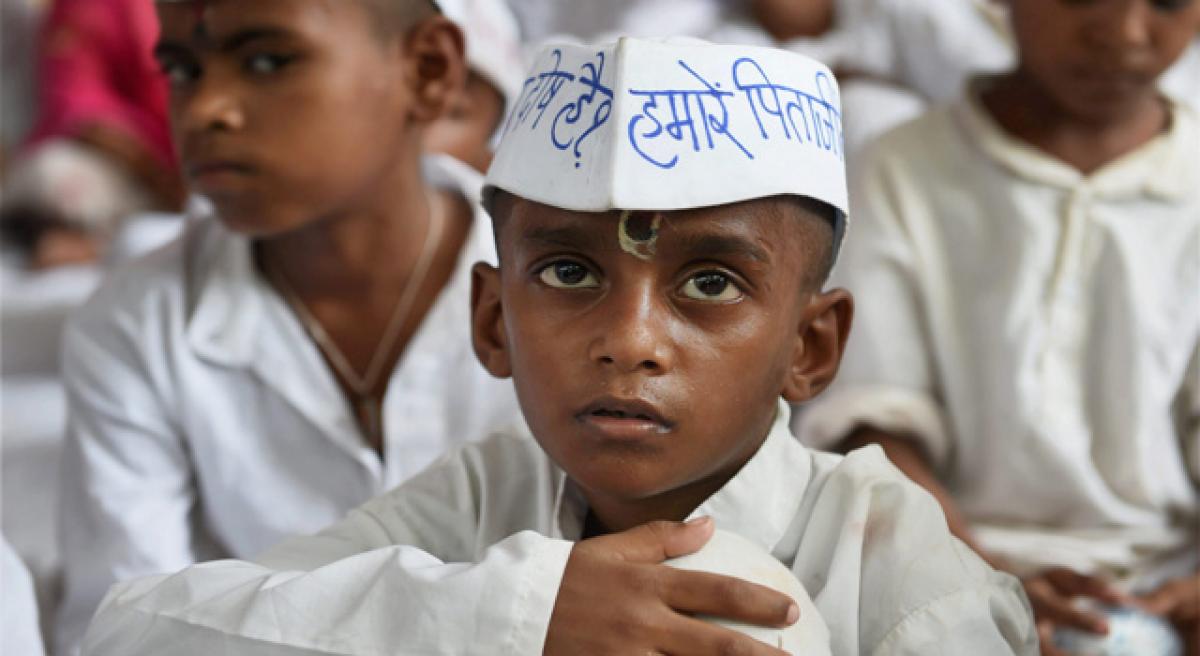Live
- BJP MP candidate Bharat Prasad visited the student who tried to commit suicide
- PM’s popularity in the fast lane: Autos with 'Har Dil Mein Modi' slogan spotted across Delhi
- Delhi-based political parties are like East India Company: Sukhbir Badal
- Golf: Diksha moves into Top-20 at South African Women’s Open
- KCR lashes out against BJP and Congress for destroying Telangana
- Dairy Science students visited the Milk cooling plant
- Moody feels Pant ahead in keepers’ race for T20 WC squad; Srikkanth picks Rahul over Samson as reserve keeper
- Thanking voters for extending 'unparalleled support' to NDA, PM Modi says second phase 'too good'
- Natural Relief for Menstrual Cramps: Beetroot Juice Recipe
- Asha Worker died in a road accident
Just In

What does father mean to you? Father to me is a lifeless body, dangling from a tree, few yards away from our house, into the fields that stretch across the horizon. Arush Patil, all of four, said it in one breath and took a pause, before getting busy fiddling with a pouch of water. Like children his age, his attention span is short, and eyes clear and sparkling.
New Delhi: What does father mean to you? Father to me is a lifeless body, dangling from a tree, few yards away from our house, into the fields that stretch across the horizon. Arush Patil, all of four, said it in one breath and took a pause, before getting busy fiddling with a pouch of water. Like children his age, his attention span is short, and eyes -- clear and sparkling.
Except that, unlike children his age, Arush does not even know his father's name, who is a statistic in Maharasthra's decades-old farm crisis, which has seen thousands, reeling under debt and bad crop, ending their lives. Arush is the among the forty-odd children from the region, who are in Delhi's Jantar Mantar with a message: Suicide is not the solution. And a plea: Could you spare us some attention?
He, along with 400 other children, many of whom are orphans, call a charity-run facility in Maharashtra's Nashik district their home. A farmers' movement, being spearheaded by 162 organisations, have brought them to Delhi as part of the ongoing 'Kisan Mukti Yatra'. "My father had a banana farm. But he did not get value of his produce.
People haggle with farmers over few rupees, middlemen cheat them, banks put pressure to repay debt. Then one fine day, a farmer ends his life. My father did so, I don't want others to suffer like me," Pallavi Dinesh Pawar, studying in class 9, said. Anupam of Yogendra Yadav-led Swaraj India, which is a part of the movement, said the children all appear wise beyond their years due to circumstances they find themselves in.
"For the urban populace, whenever farmers gather, it becomes a traffic issue. We wanted to highlight the human element of the rural distress by bringing these kids to Delhi. If their stories don't disturb us, nothing will," Anupam said. In fact, the point about these children being wise beyond their years becomes clear as one speaks to Arush, Pallavi, Ashok, Gangukrushna Kurkute, Balkrushne Chandrakant, Dnyaneshwar and others, who are even aware of the recommendations of the MS Swaminathan Commission report.
Fourteen-year-old Gangukrushna, studying in class 9, lost his father when he was in fifth standard. "He had taken loan from a local money-lender. When the crops failed, the loan could not be paid back. Under pressure, he drank poison to end his life," he said.
The children walk to a government school, four kilometres away, an official of the charity home, who accompanied them to Delhi, said. "Currently, it has around 400 inmates. The pressure to admit more is intense. Our waiting list is only swelling. Currently, around 1800 children are on the list of applicants, which reflects the magnitude of the crisis," the official said.
A little later, Pallavi was called on to the stage to address the modest gathering, also comprising farmers from Tamil Nadu, apart from neighbouring Punjab, Haryana, Rajasthan and Uttar Pradesh. "My father committed suicide when I was three. His step may have ended his pain, but it worsened our situation. We were left to fend for ourselves. My message would be..." her voice choked, as she left the stage wiping her eyes.

© 2024 Hyderabad Media House Limited/The Hans India. All rights reserved. Powered by hocalwire.com







